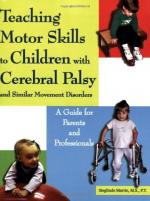|
This section contains 3,202 words (approx. 11 pages at 300 words per page) |

|
Definition
Cerebral palsy (CP) is the name given to a collection of movement disorders. Movement disorders are conditions in which a person's muscles do not respond normally. CP is also known as static encephalopathy (pronounced in-seh-fuh-LAH-puh-thee). It is caused by brain damage that occurs before, during, or just after birth. A person with CP is often also affected by other conditions caused by brain damage.
Description
If a person is affected by CP his or her muscles may become either rigid or very loose. Sometimes an individual may lose control of his or her muscles, resulting in problems with balance and coordination. The condition may affect the legs only, which is called paraplegia (pronounced par-uh-PLEE-jee-uh) or diplegia (pronounced die-PLEE-juh); the arm and leg on one side of the body, which is known as hemiplegia (pronounced hem-i-PLEE-juh); or all four limbs, called quadriplegia (pronounced kwod-ruh-PLEE-jee-uh).
Other problems...
|
This section contains 3,202 words (approx. 11 pages at 300 words per page) |

|


